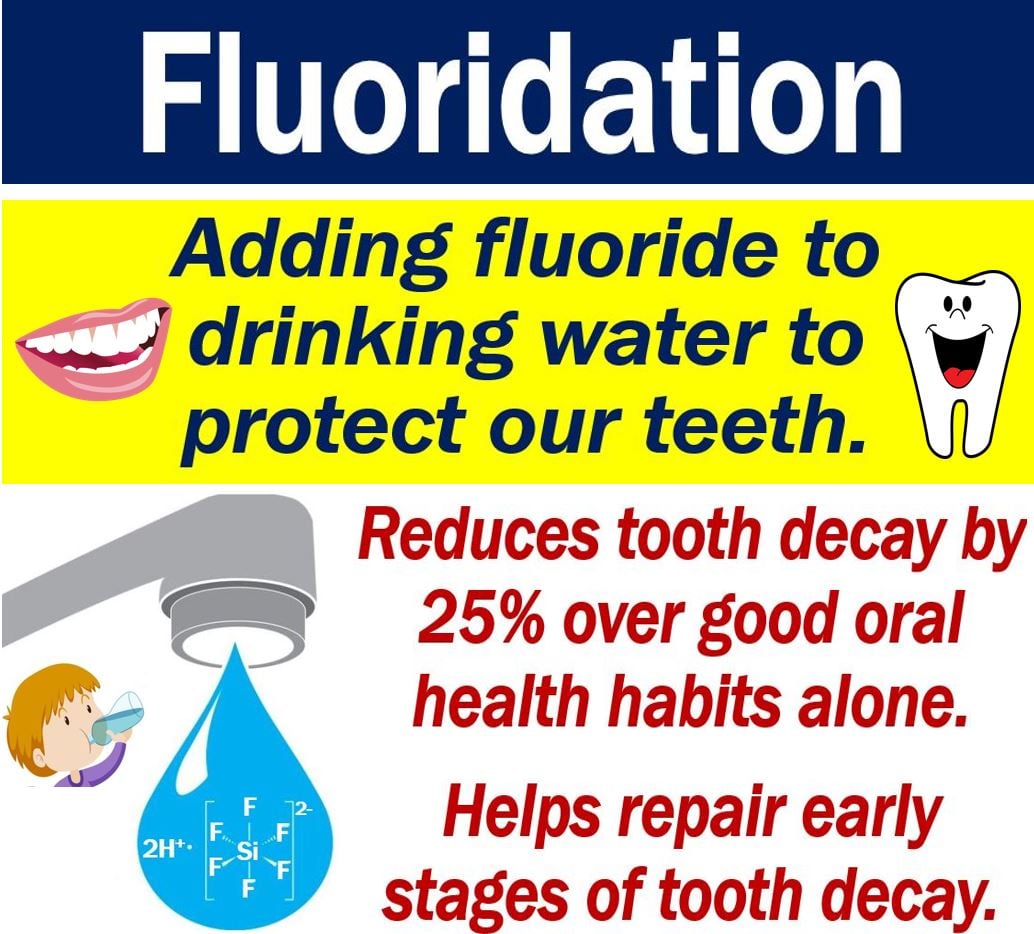Fluoridation is the addition of fluoride to drinking water to protect our teeth from decay. When drinking water has 1 ppm of fluorine ions, it significantly helps prevent tooth decay (ppm = parts per million). Higher amounts, however, may cause dental fluorosis, i.e., discoloration or spots on the enamel (tooth surface).
Community water fluoridation is the process of deliberately adding fluoride to drinking water. In other words, adjusting fluoride levels in drinking water to prevent tooth decay.
The New South Wales (NSW) Ministry of Health in Australia says the following regarding adding fluoride to drinking water:
“Water fluoridation prevents dental decay in all ages. It is a safe, legal and ethical way of providing benefit to everyone, especially those who are disadvantaged.”
“Despite fluoride in toothpaste, there is still substantially more tooth decay in unfluoridated areas compared to fluoridated areas of NSW.”
In many parts of the world, utility companies add fluoride to drinking water. Utility companies are those that provide electricity, natural gas, or water.

Fluoridation – What is fluoride?
Fluoride, a mineral, occurs naturally on Earth. Rocks release it into the soil, air, and water.
All water has a certain amount of fluoride. However, there is not usually enough in it to prevent tooth decay.
Some natural springs and groundwater, however, have high levels of fluoride.
Fluoridation – strong teeth
Adding fluoride to drinking water benefits us all, children and adults, throughout our lives.
For very young children, i.e., under eight, fluoride helps strengthen the permanent adult teeth. When a child is under eight, adult teeth are developing under their gums.
Fluoride in water supports tooth enamel in adult teeth. It keeps our teeth strong. It also keeps our teeth healthy.
Fluoride – benefits
The four main benefits of having fluoride in water are:
- Less severe cavities.
- Fewer cavities.
- Less need to remove teeth or have fillings.
- Less suffering and pain due to tooth decay.
The US Centers for Disease Control and Prevention (CDC) says that adding fluoride to drinking water saves money for both the health care system and families.
“The return on investment for community water fluoridation varies with size of the community, increasing as the community size increases,” the CDC adds.
Fluoridation health risks?
Some people claim that fluoridation is dangerous for human health. However, over the past fifty years, studies have not associated fluorides in water to significant health risks.
The British National Health Service (NHS) says the following regarding the scientific studies over the past fifty years:
“Overall, these reviews found that water fluoridation appears to contribute to reduced tooth decay levels and doesn’t seem to be associated with any significant health risks.”
Regarding concerns that fluoride may lead to a variety of health conditions, the NHS says reviews have not produced any convincing evidence of this.
Video – Fluoride and healthy teeth
This Sci Show video explains why Fluoride is good for your teeth.
